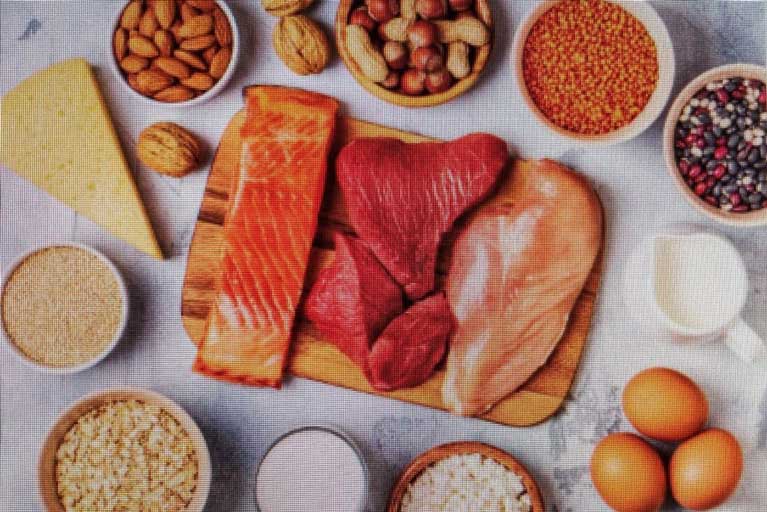Seven Things Seniors Should Know About Nutrition
It is hard to know what to eat these days. It seems that different research studies are released every other day with conflicting or confusing information. Vintage Fitness has been training ONLY seniors for 16 years. We know how people’s nutritional needs change as they age and how best to coach lasting behaviour change to meet their changing dietary needs.
This week’s blog is taken from a nutritional webinar presented by Jennifer Ferguson, a personal trainer and Precision Nutrition Level 1 Coach.
To improve your health, you need to consider these seven things:
1. Protein:
- Critical to the body’s recovery, repair and rebuilding mechanisms
- Have some at every meal: .8-1.2 g per kg of body weight per day: approximately two palms of protein for men; one for women, depending on your current health status, activity level and goals
- Too much protein can be hard on your kidneys
- Low-fat (lean) fibre-rich proteins are best: beans and legumes, chicken, fish, protein (powder) shakes
2. Carbohydrates:
- Body’s primary and preferred source of fuel, especially for the brain
- Carbs that are also high in fibre promote normal blood cholesterol, help modulate blood glucose, maintain healthy bowel function and reduce risk of bowel disease, and promote healthy body weight
- Whole grains, cereals, rice and pasta; fruit and vegetables (especially important if fluid intake and activity levels are low)
- 30 g/day for men 51+; 21 g for women 51+
- Two cupped handfuls for men; one cupped handful for women per meal
3. Healthy Fats:
- Provides essential fatty acids - a concentrated energy source
- Required to transport fat-soluble vitamins (A,D,E and K); contribute to satiety
- Omega 3s (brain health) - fish, tofu, low-fat dairy, poultry and other lean meats, and Omega 6s
- Limit saturated (red meat), trans fats and fast and/or processed foods
- Include healthy fats – certain oils, nuts and seeds: may help reduce oxidative stress and inflammation
- Two thumbs for men; one thumb for women per meal
4. Hydration:
- 2-3 litres/day; 8-12 (1-cup) servings a day; more if you are physically active
- Kidneys less efficient
5. Vitamins:
- Consult your doctor before taking any supplements, especially iron, B12, Vitamin D/C, Vitamin E and folate
- A low-dose multivitamin for 50+, excluding Vitamin A, may be all you need to round out your nutrient needs
6. Medication:
- People 65 years+ take ¼ of all prescription and over-the-counter medications sold in North America
- Many offer great health benefits but they can also pose a threat to nutritional status due to complicated interactions and side effects - consult your doctor
7. Alcohol:
- 2-10% of people 65 years+ drink more than is recommended
- Alcohol of any description is rated as a #1 carcinogenic by the International Agency for Research on Cancer (IARC)
- If you drink, do so in moderation:
- Up to 14 drinks/week for men
- Up to 7 drinks/week for women
- Loneliness, isolation and depression may lead some seniors to drink more than they should
Do you need expert help to get your health and nutrition back on track?
Find out more about Nutrition Coaching
Good Luck!
Erin
Vintage Fitness
Vintage Fitness is a personal training company in Toronto, Canada. We specialize in energizing the lives of people over 50 with exercise.
Search
Categories
- Abdominal / Waist Exercises
- Aches and Pains
- Aging Well
- Arm Exercises
- Arthritis
- Back exercises
- Balance for Seniors
- Core
- Diabetes
- Elastic Band Exercises
- Exercise Programs
- Fitness Goals
- Flexibility Exercises
- Guest blog
- Hands
- Heart Health
- Incontinence Exercises
- Knees
- Leg Exercises
- Mental Health
- Neck Exercises
- Nutrition
- Osteoporosis
- Other
- Personal Training
- Posture
- Sciatica
- Shoulder
- Strength Exercises
- Stretching Exercises
- Success Stories
- Virtual Training
- Webinar
- Weight Loss
- Women’s Health






